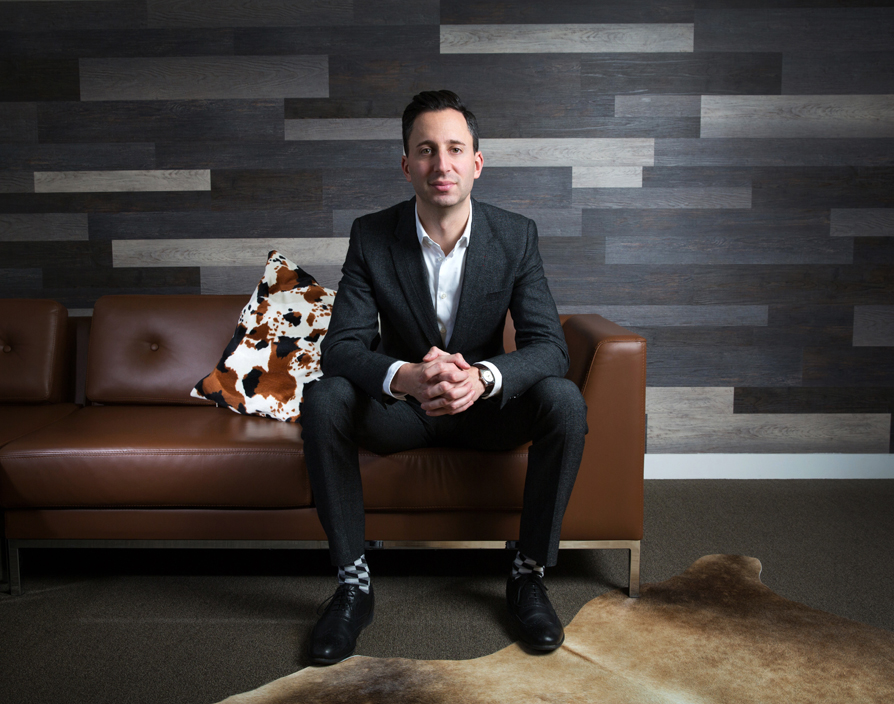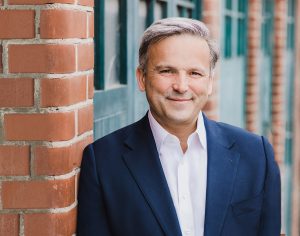The first time Joshua Graff felt truly out of his depth was when he was pitching to a hotshot in a New York boardroom to win a contract for JAM International, the ad agency he’d founded. With the confidence and self-belief that only a 22-year-old can have, the entrepreneur had successfully walked the potential client through his proposal but when she enquired about whether his figures were gross or net, Graff found himself stumped. And so he began what’s become a lifelong pursuit of acquiring skills and knowledge.
As the UK country manager and vice-president for EMEA at LinkedIn, the professional networking platform, Graff is at the top of his game. But he didn’t exactly take the most direct path to get there, having left university without a degree after realising that all the free time university life offered was making him feel uneasy. “I’m not very good when I have a lot of time to think,” he says. “And at the same time, I was feeling a sense of anxiety about my sexuality. It wasn’t the healthiest of situations.”
Realising that, unlike may of his peers, he didn’t know what he wanted to do yet and university wasn’t working for him, Graff made the bold decision to abandon his degree halfway through and venture out into the world of work. “I’d love to say I had a plan but I didn’t,” he recalls. “I admire people who know from an early age what they want to do but I wasn’t one of those people.” And while his first few gigs working as a runner at events and a researcher for a TV show weren’t necessarily his dream career, something clicked. “I was thrown in at the deep end and I was finally doing something that felt right and had tangible results,” he says. “I’d found my calling”.
But Graff was still plagued by a nagging sense that he wasn’t quite good enough or being true to himself. And part of this was down to the fact that even though he’d told his friends and family that he was gay long ago, he’d never broached the subject at work. “I had dropped out of uni and mistakenly felt that coming out at work would make me look weak,” he recalls. Fortunately nothing could be further from the truth: once he finally plucked up the courage to come out to his colleagues, Graff felt a sense of relief when he found he was treated no differently. “For the first time, I was happy both at work and at home,” he says.
Even so, that need to put in the extra hours to compensate for his insecurities has never fully left him. “I’ve always had a bit of a case of imposter syndrome, which means I feel the need to prove to others and myself that I’m capable,” he says. “It’s not a weakness, though: it’s spurred me on over the years and I actually see it as my biggest asset.” Worrying about how he measures up has meant that Graff has constantly sought to prove himself, channeling his self-doubt into a passion for honing his skills and boosting his knowledge. And this passion for learning is also part of what attracted him to his current role at LinkedIn. “Learning is critical for success so it should be a continual process,” he says.
But while there are plenty of people in the UK who, like Graff, are passionate about acquiring knowledge, Britain is still facing a skills gap in certain areas, particularly in science, technology, engineering and maths (STEM). Graff acknowledges that while many LinkedIn users are actively trying to forge a career for themselves, there are plenty of people in Britain who get left behind, without a job or formal qualifications who are struggling to get a leg up. There’s no magic bullet but Graff has a few ideas. “You can’t just look at the existing workforce,” he says. “You have to start much earlier when people are still in school.”
And through his work for founders4schools, the employability initiative, Graff has seen first hand the difference it can make to a young person’s life when they receive the right advice early on – particularly when the advice comes from people outside their usual circles. “It’s important that young people come into contact with role models who can show them that there’s no single, linear path to employment,” he says. “I do think this is the key to bridging the skills gap in the future.” However, there are no quick fixes when it comes to safeguarding Britain’s talent pipeline. “Government, schools and business have to work together on this,” he says. “But that’s a long-term play. In the short term, businesses need to be able to access talent from the EU, the US and Asia.”
Graff is also passionate about levelling the playing field for candidates and ensuring nobody gets left behind just because they haven’t gone to the right school or have chosen not to go down the degree route. “Our core mission at LinkedIn is to help people expand their network so there’s a more equal access to opportunities,” he says. Instead, the platform aims to give people more direct access to the movers and shakers in their industry, stripping away the barriers that once existed. “No longer is the CEO totally unreachable, tucked away in a tower in Canary Wharf,” he says. “They’re just a few clicks away. We need to move away from being a society where you get ahead because of your family connections.”
As for Graff himself, he may still get the odd pang of insecurity and is still swotting up to keep his imposter syndrome at bay but being able to be himself in the office is helping him to thrive. “I can bring my authentic self to work every day,” he concludes. ![]()
Share via:








































